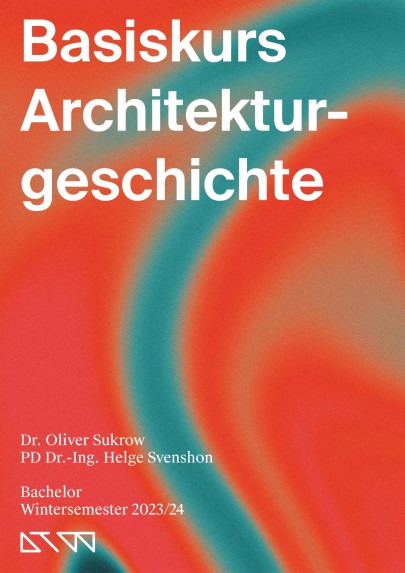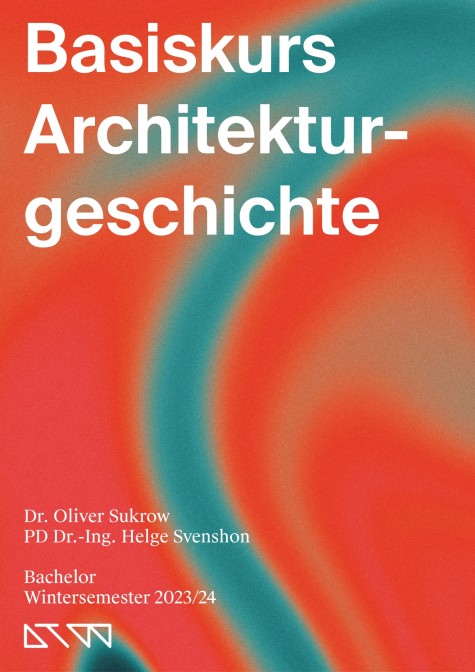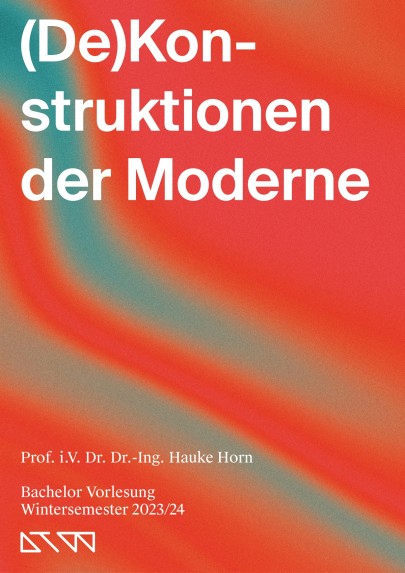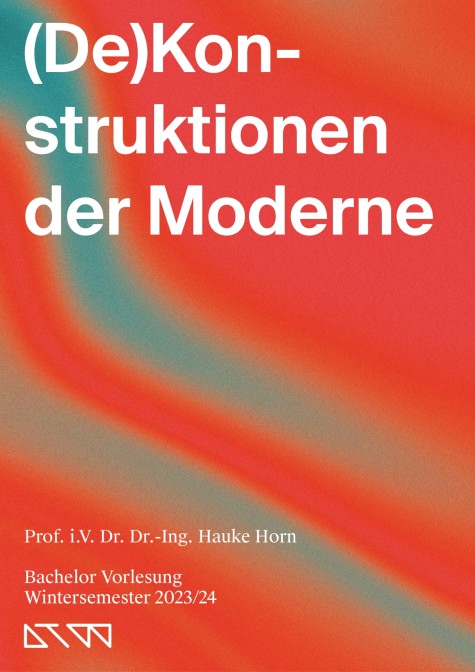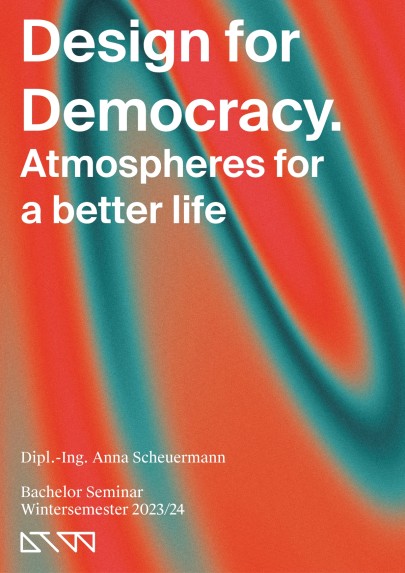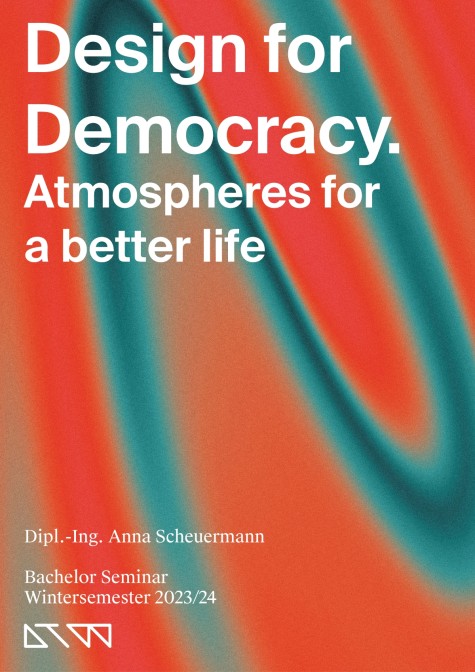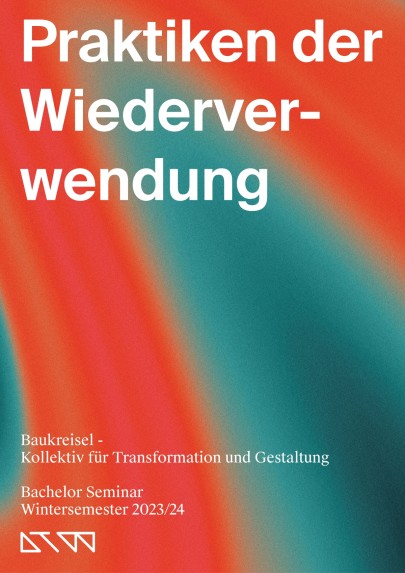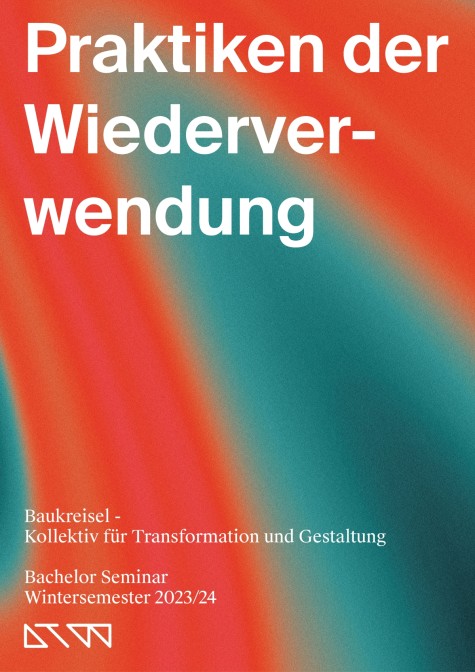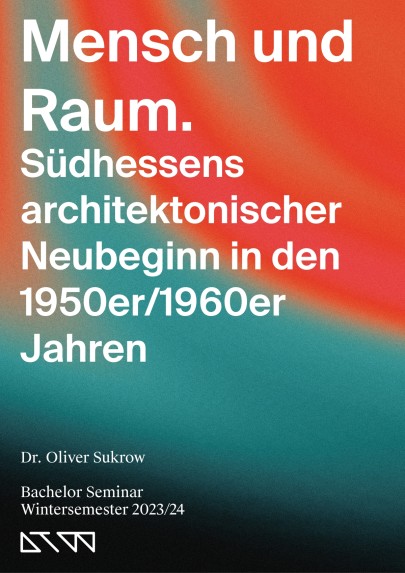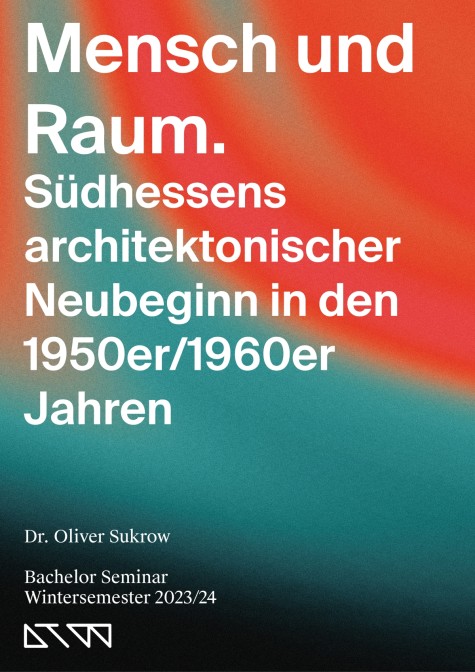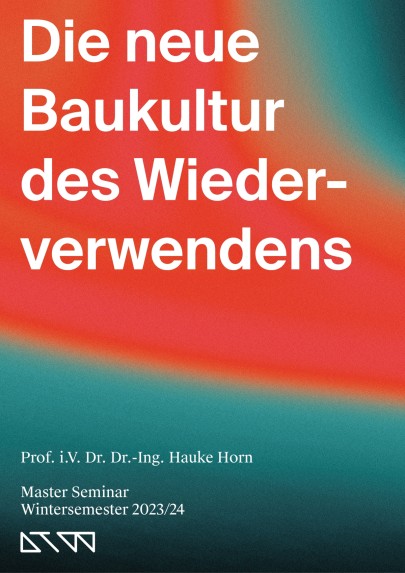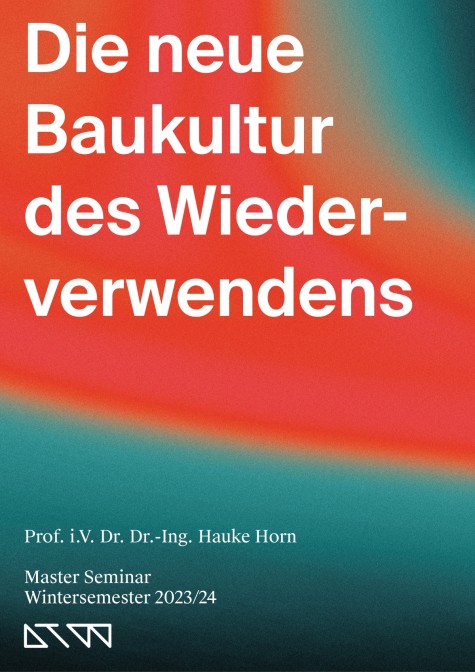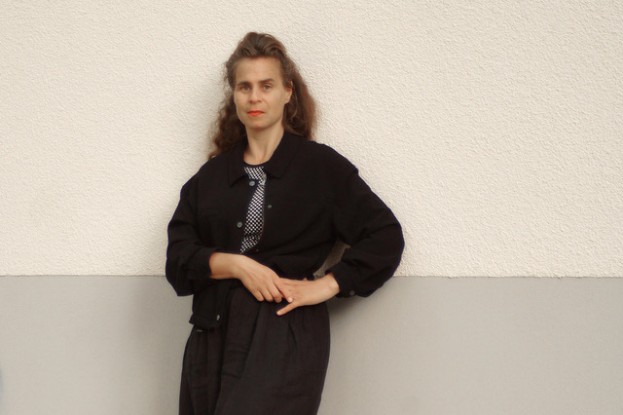Summer Semester 2024
Bachelor
Die Stadtsilhouette Darmstadts ist geprägt durch Bauten wie dem Hochzeitsturm auf der Mathildenhöhe, dem „langen Ludwig“ oder dem erst kürzlich wiedereröffneten Wissenschaftsschloss. Ähnlich sichtbar sind im Darmstädter Stadtbild jedoch auch die Hinterlassenschaften des Zweiten Weltkrieges. Insbesondere die Spitzbunker im Norden Darmstadts ragen als halb vergessenes Mahnmal an diese Zeit auf. In Vorbereitung auf die Gedenkveranstaltung zur Darmstädter Brandnacht vor 80 Jahren wird einer dieser Bunker in Zusammenarbeit mit der Denkmalbehörde der Stadt ausgiebig untersucht, um ihn der Öffentlichkeit zugänglich zu machen.
Im Seminar werden Konzepte entwickelt, wie man sich architektonisch und grafisch dieser sensiblen Thematik annähern kann. Als Grundlage werden wir uns dazu zunächst dem Bautypus „Bunker“ bauhistorisch, bautechnisch, kulturell und soziologisch auseinandersetzen. Im Fokus steht dabei die insbesondere die Auseinandersetzung mit den bestehenden Bunkern in Darmstadt. Es ist geplant, dass die Ergebnisse dieses Seminars direkt in die Planungen zum diesjährigen Gedenkmonat der Darmstädter Brandnacht einfließen.
Bachelor
Clemens Brünenberg
15. April 2024 Einführungsveranstaltung (L3|01 110)
Care-Arbeit beschreibt die bezahlte oder unbezahlte Arbeit der Fürsorge, für das Wohlergehen anderer Menschen, wie etwa Pflege. Architektur bietet nicht nur Schutz und Raum für menschliches Leben, sondern kann auch als eine Form der Fürsorge bzw. Care verstanden werden. In der Geschichte wurde Architektur oft als autonomes Kunstwerk betrachtet, während ihre sozial-gesellschaftlichen Implikationen vernachlässigt wurden. Unser Seminar untersucht, wie Geschlecht, race und Klasse historisch die Vorstellung von Architekt:innen beeinflusst haben und warum Carearbeit in der Architekturdiskussion oft unsichtbar blieb und bleibt. Die Fragen, wer sich um Architektur kümmert, für wen gebaut wird und wie gesellschaftliche Herrschaftsverhältnisse durch Architektur fortgeschrieben werden, stehen im Fokus unserer Diskussion. Wir werden die Gründe für die historische Trennung von Architektur und Care untersuchen. Dabei werfen wir einen Blick darauf, wie bestimmte Gruppen von Menschen historisch von der Architekturpraxis ausgeschlossen wurden. Das Seminar bietet die Möglichkeit, sich mit den Ideen von Care in der Architektur auseinanderzusetzen und neue Perspektiven zu entwickeln. Wir werden darüber diskutieren, wie eine zeitgenössische Architekturpraxis aussehen kann, die Care als integralen Bestandteil von (sozialer) Nachhaltigkeit versteht und uns dafür mit “Orten der Fürsorge” beschäftigen.
Bachelor
GLOSS (Group Lab of Social Sustainability)| Hannah Gerules
Termine
22. April 2024 um 15.15 Uhr: Einführungsveranstaltung im ATW Seminarraum (315)
25.-27. Juli 2024 von 10.00 – 17.00 Uhr
Im Rahmen des Seminars soll Architektur nicht nur als Spiegel ihrer Zeit, sondern als Medium des visionären Denkens und der architektonischen Konzeption von sozialen, gesellschaftlichen Ideen betrachtet werden. Dafür sollen verschiedene Beispiele zeichnerischer und baulicher Umsetzung von architektonischen Utopien des frühen 20. Jahrhunderts aus Russland und Europa, die in dieser Zeit einen großen Aufschwung erlebten, vorgestellt, analysiert und diskutiert werden. Dies soll helfen, die Architekturzeichnung als Mittel des ‚unverfälschten‘ Ausdrucks von ‚philosophisch-zeichnerischen‘ Überlegungen und Visionen und das eigentlichen Bauen, das immer an reale Gegebenheiten wie gesellschaftliche, städtische, örtliche, finanzielle Vorgaben und Rahmenbedingungen gebunden und nachfolgenden Problemen wie Materialabnutzung ausgesetzt ist, ins Verhältnis zu setzen und zu vergleichen.
Bachelor seminar
Nastja Müller
Termine
16. April 2024 von 12.00 bis 14.00 Uhr | Einführungstermin im ATW Seminarraum (315)
27. April 2024 von 10.00 bis 17.00 Uhr
04. Mai 2024 von 10.00 bis 17.00 Uhr
11. Mai 2024 Exkursion Weißenhofsiedlung Stuttgart
Winter Semester 2023/24
Bachelor
Das einsemestrige Modul zur Einführung in die (als westlich-europäisch kanonisierte) Architekturgeschichte gibt anhand ausgewählter Beispielbauten einen ersten Einblick in die Stil- und Epochengeschichte sowie unterschiedliche Bautypen und Bauaufgaben von der Antike bis in die Gegenwart. Im Zentrum steht die eigenständige Erarbeitung eines Kurzreferats, in dem das vorgestellte Bauwerk beschrieben und mithilfe von Vergleichsbauten in den Kontext der europäischen Architekturgeschichte eingeordnet wird. Neben einem Grundwortschatz architekturhistorischer Termini sowie deren Anwendung werden dabei die Recherche von themenspezifischer Literatur und der wissenschaftliche Umgang mit Informationen eingeübt. In einer Prüfung am Semesterende werden die im Kurs erarbeiteten Kenntnisse überprüft.
Bachelor
Dr. Oliver Sukrow
PD Dr.-Ing. Helge Svenshon
Modern – das sagt sich schnell, doch was heißt das überhaupt? In der Vorlesung wird der Modernebegriff – oder besser gesagt: die Modernebegriffe – anhand der architektonischen und städtebaulichen Entwicklung des 20. Jahrhunderts bis in die Gegenwart hinein als Leitbegriff, der mehr oder weniger stark akzeptiert oder abgelehnt wurde, vorgestellt und diskutiert. Neben konstruktiven, funktionalen und ästhetischen Entwicklungen wird ein Schwerpunkt der Betrachtung auf dem Verhältnis von Architektur und Umwelt liegen, das den heutigen Diskurs vor dem Hintergrund von Klimawandel und Umweltverschmutzung immer mehr bestimmt. Selbstverständlich werden Architektur und Städtebau hierbei stets im Kontext der politischen, technischen und kulturellen Gegebenheiten der Zeit betrachtet.
Bachelor Vorlesung
Prof. i.V. Dr. Dr.-Ing. Hauke Horn
Reusing and continuing to build have a long tradition in architectural history, which was somewhat forgotten in the 20th century. Against the background of current global challenges such as climate change, environmental pollution and the exhaustion of natural resources, these old concepts are once again coming to the attention of building practice as they offer a huge reservoir of approaches and inspiration. Recycling and reusing old materials and building components not only conserves natural resources and reduces energy consumption and CO2 emissions in the construction industry. These processes also offer a way to preserve the history and identity of places.
Bachelor seminar
Prof. Dr. Dr.-Ing. Hauke Horn
1st meeting: 17.04.2023, 10:00, L3|01 room 437
Wie lässt sich zirkuläres Bauen in der Realität umsetzen? Was für Potentiale weckt das Arbeiten mit wiederverwendetem Material? Welche Transformation braucht der Berufstand? Wie verändert sich das Planen und Bauen bei der Verwendung von vorhandenem Material?
In diesem Seminar werden wir zwei zentrale Aspekte kombinieren: die Nutzung wiederverwendbarer Baumaterialien und das partizipative Entwerfen.
Der Kern des Kurses ist die konkrete Umsetzung eines Projektes. Dabei nähern wir uns den technischen Herausforderungen und der Komplexität, die das Bauen mit Bestehendem mit sich bringt.
Erweitert eure Fähigkeiten im partizipativen Entwerfen. Werdet Teil eines nachhaltigen Gestaltungsprozesses und tragt zur Entwicklung einer kreislaufgerechten Zukunft bei.
Bachelor seminar
Dr. Oliver Sukrow
1st meeting: 18.04.23, 10-11:30, L3|01
Nach dem Zweiten Weltkrieg und der Gründung des Bundeslandes Hessen 1946 begann eine neue Epoche der Architekturgeschichte, die bis heute nachwirkt. Wir wollen uns im Seminar einen Überblick über die Wiederaufbauleistungen, aber auch über die geistigen Konzepte (z.B. in den „Darmstädter Gesprächen“) und politisch-sozialen Rahmenbedingungen verschaffen und „Hessen im Wiederaufbau“ von den späten 1940er Jahren bis Ende der 1950er Jahre betrachten. Der räumliche Schwerpunkt wird auf Frankfurt und Südhessen liegen, aber auch Vergleiche zu anderen Bundesländern sowie zur DDR umfassen. Der Schwerpunkt wird auf dem öffentlichen Bauen und im Wohnungsbau der Nachkriegszeit liegen; beides auch heute wieder kontrovers diskutierte, relevante Bauaufgaben.
Bachelorseminar
Dr. Oliver Sukrow
Master
Das Wiederverwenden und das Weiterbauen haben in der Architekturgeschichte eine lange Tradition, die im 20. Jahrhundert ein Stück weit in Vergessenheit geriet. Vor dem Hintergrund aktueller globaler Herausforderungen wie Klimawandel, Umweltverschmutzung und Ausschöpfung der natürlichen Ressourcen geraten diese alten Konzepte wieder in den Blick der Baupraxis und bieten ein riesiges Reservoir für Ansätze und Inspirationen. Mit dem Recycling und Reuse alter Materialen und Gebäudeteile lassen sich nicht nur natürliche Ressourcen schonen und der Energieverbrauch und CO2-Ausstoß der Bauwirtschaft reduzieren. Zugleich bieten diese Verfahren eine Möglichkeit, Geschichte und Identität von Orten zu bewahren.
Das Seminar ist an die gleichnamige Tagung “Die neue Baukultur des Wiederverwendens” gekoppelt, die vom 31. Januar – 2. Februar 2024 an der TU Darmstadt stattfinden wird. Studienleistung ist die Teilnahme an der Tagung und das Verfassen von Papern zu unterschiedlichen Vorträgen. Flankiert wird die Lehrveranstaltung von zwei Sitzungen, an denen wir die Tagung vorbereiten, indem wir u. a. aktuelle Positionen des Wiederverwendens kennenlernen und disktutieren werden, aber auch die Tagung als wissenschaftliches Format besprechen.
Masterseminar
Prof. i.V. Dr. Dr.-Ing. Hauke Horn
Summer Semester 2023
Bachelor
"Artefacts of Assembly” is a collective investigation of the fundamental values of social, activist movements and their spatial implications, to then explore organisational models and physical infrastructure for new collective ideals. What artefacts and spaces could support collective actions emerging from value sets such as self-organisation, civil disobedience, decentring, intersectionality and the common good? How can we, by means of social and spatial practices, confront and celebrate radical differences instead of reproducing normative conceptual iterations of sameness?
In this particular instance, we want to look at how the physical (and emotional) space of the architecture school is in itself a reflection of the built environment it produces through the education of future architects. You will be asked to creatively survey and analyse spaces of assembly within the boundary of the school, before proposing a 1:1 spatial intervention that challenges given conditions and shows possibilities to appropriate the spaces differently, even to (partly or entirely) alter their structure, composition and usage.
Bachelor seminar
EXUTOIRE: Bui Quy Son, Paul-Antoine Lucas
Block session
26.05. – 28.05.2023
Reusing and continuing to build have a long tradition in architectural history, which was somewhat forgotten in the 20th century. Against the background of current global challenges such as climate change, environmental pollution and the exhaustion of natural resources, these old concepts are once again coming to the attention of building practice as they offer a huge reservoir of approaches and inspiration. Recycling and reusing old materials and building components not only conserves natural resources and reduces energy consumption and CO2 emissions in the construction industry. These processes also offer a way to preserve the history and identity of places.
Bachelor seminar
Prof. Dr. Dr.-Ing. Hauke Horn
1st meeting: 17.04.2023, 10:00, L3|01 room 437
Within walking distance from Campus Lichtwiese are the Paulus- and Komponistenviertel, the Mathildenhöhe and the Eberstädter Villenkolonie, ensembles of villas from the 19th and 20th centuries that are of national importance. They bear witness to the economic and cultural upswing of Darmstadt around 1900, but also to a certain idealistic attitude to the question “How to live?” In the seminar we will therefore deal with the historical and social foundations of (bourgeois) villa construction. In addition, we will focus on the stylistic description and artistic classification of Darmstadt's villa buildings. We want to ask about architects, clients, garden designers and the reception and dissemination of this building task outside Darmstadt and also illuminate the position of villa construction today. Two excursion dates are planned in Darmstadt and one in Bensheim an der Bergstraße, in order to discuss the observations made in the seminar room in front of the buildings.
Bachelor seminar
Dr. Oliver Sukrow
1st meeting: 18.04.23, 10-11:30, L3|01
Master
Please note: this seminar is in English.
We all have been to, or have seen, a hospital in our life time. But have ever wondered how have we gotten here in term of hospital architecture? This seminar is provoked by this question; it will provide the students with a knowledge of the history of hospital architecture from the nineteenth century to the present. It is interactive and hands-on. We will read and discuss 4 texts and examine plans and photographs of various hospitals. Through these activities, the students will be encouraged to think about ‘whose history’ is the history of the modern hospital? Subsequently, they will work on exploring ways through which they could revise this history. For their final project, the students will be asked to choose a hospital or a region, based on their preference, and discuss what can a focus on the hospital or region of their choice add to our understanding of the rise of the modern hospital?
Masterseminar
Dr. Sara Honarmand Ebrahimi
Block session
28.4.; 19.05.; 02.06.23, 10:30-17:00
1st meeting: 1.04.2023, L3|01 room 110
Originally founded as a successor to the Bauhaus, the private Hochschule für Gestaltung on the Kuhberg in Ulm is today considered the most important innovative educational institution of the early Federal Republic of Germany. It succeeded in reactivating the modernist project stifled by the Nazi dictatorship and adapting it to the economic, social and technical demands of the post-war period. With a radically modern and at the same time holistic teaching concept, which in addition to artistic-craft design also included philosophy and sociology and beyond that the highly topical currents such as cybernetics, information aesthetics or philosophy of science, the students were prepared for the design challenges of a science-based industrial production. However, in contrast to the internationally known designs of the product design department, for example for the Braun company, the projects from the architecture department are largely unknown and have not yet been sufficiently worked on.
In our seminar this desideratum is to be remedied. The aim is to bring the former players, their unique teaching concept as well as the exciting work of the students and teachers back to consciousness in order to participate in their innovative potential.
An excursion with a workshop at the HfG Ulm is planned, in cooperation with the Chair of Architectural Theory at Leibniz Universität Hannover.
Masterseminar
Dr.-Ing. Helge Svenshon; Dr. Chris Dähne
Monday, 15:30-17:00, L3|01 room 110
1st meeting: 17.04.23, 15:30
Winter Semester 2022/23
Bachelor
Modern Architecture can no longer be looked at as a singular style emerging from Europe. Taking modernity as a pluralistic concept, this lecture will introduce a diverse array of global geographies and multiple aesthetics. We will look at these “constructions of modernities” both in their political and aesthetic intentions, and will evaluate not just their success, but their social consequences. Studying the emergence of new materials, we will see how changing economic and labor conditions produced new architectures. Studying iconic buildings and settlements, we will expand our view to their extension into the colonies to investigate how the rationality often assigned to modern architecture was also a mode of control and extortion. We will encounter modern architectures, question their ideologies, and contextualize their construction.
Bachelor Lecture Course
Prof. Dr. Anna-Maria Meister
Monday, 11:40-13:20. L3|01 A93 (Max-Guther-Hörsaal)
1st meeting: 17.10.2022
How does architecture materialize “invisible” financial mechanisms? What does finance look like; where is it located? If it has an aesthetic and a contingent materiality, can finance be understood as an architectural phenomenon?
Positioning architecture at the center of global financial processes—mediating the economy across political borders and jurisdictions—this course examines the intersection and historical interdependencies between finance and architecture in global capitalist modernity. While the seminar focuses on the second half of the twentieth century, longer histories of empire—from colonialism and “informal” imperialism to neocolonial rule—will feature prominently in order to connect financial centers like the City of London, Hong Kong, and Frankfurt to an intricate system of “offshore” territories and financial “hinterlands” such as Accra and Port-au-Prince.
Assigned readings will be in English.
Bachelor seminar
Prof. Dr. Anna-Maria Meister
Eva Schreiner M.A.
Block session
1st meeting: 24.10.2022, 17:00, L3|01 room 51 (Fachbereichssaal)
The spatial (re)organisation of domestic work is a recurring theme in the history of housing and urban planning. Empirical studies in the post-war years at the Swedish Hemmens forskningsinstitut / Statens institut för konsumentfrågor bear witness to this. Not only since the pandemic have household activities overlapped with gainful employment. Related spatial negotiation processes pose the task for architects to deal with questions of the spatial (re)organisation of domestic work in all its facets, within the private household and between home and city.
Against the backdrop of historical references, the seminar empirically examines dwelling practices and their spatial (dis)orders, with the aim of making the findings fruitful for the design. Based on their analyses, the participants develop spatial interventions.
Bachelorseminar
Dr.-Ing. Julia von Mende (LA)
Block session
1st meeting: 17.10.22, 13:30, L3|01 room 51 (Fachbereichssaal)
The historical Bauhaus was so far the only architecture school with a dedicated stage department. This was not only a place for theater and dance, but also for experimenting with space, form, color, sound and movement. The concept of the stage workshop developed in the context of ideas of the classical avant-gardes around 1900, for example the 'Gesamtkunstwerk' or the tendency towards abstraction, as well as the burgeoning reform pedagogy, which prioritized action to theory and thereby also profoundly changed architectural education.
In this seminar we will critically examine the conception and function of the historical Bauhaus stage and relate it to later experiments between architecture, theater and dance. The overriding question will be: what can we learn from the historical Bauhaus stage today? English reading skills are required.
Bachelorseminar
Dr. Lisa Beißwanger
Monday, 15:15 – 16:45, L3|01 Room 437
1st meeting: 17.10.22
Are you a model? A questionable start to a conversation one might think, and yet, architecture does beg the question. What does it mean to call something a model? Which implications, projections or desires are called to the table? Architects do not build buildings, they draw plans, they model structures or produce objects. We want to put the model front and center in an assessment of architectural thinking and doing. A new generation of virtual models promises precision, predictability and easy communication between disciplines and protagonists. Architectural models play a precise role in societal processes of making and knowing, and as cultural medium warrant another look. In this seminar, we will ask questions of the model as a tool to create knowledge—not just represent or conserve it—by investigating the modes of production and reproduction of models through digital means, their aesthetic and functional intention, their physical attributes and sensorial effects, and their role in architectural discourse.
Bachelor seminar
Prof. Dr. Anna-Maria Meister
Monday, 15:30 – 17:00, L3|01 Room 110
1st meeting: 17.10.2022
Summer Semester 2022
Bachelor
Of the three primary bodily functions—eating, resting, and execrating, —eating is the one that most impacts the cities we live in. Food consumption has generated chains of production, packaging and distribution that link the urban to the global. The logistics, processes, objects, and places—architectures—that support the different stages of the food chain today are extremely complex. The notion of freshness has pushed these designs to incredible limits. The beloved banana we buy in the supermarket has traveled from a tropical location for at least 14 days. It has been picked green, packed and kept at steady temperatures to then be ripened upon arrival with ethylene gas. Fresh bananas are now categorized as biofacts, natural products that have been technically adapted to the needs of people. But at what cost? We all know, too high. Analyzing human food consumption as an urban processes of public concern, this seminar revisits past and envisions future urbanities, expanding the ways of inhabiting the cities to come.
Bachelor seminar
Jocelyn Froimovich
Novembergruppe, Gläserne Kette, Der Ring, Der Block, Die Situationisten, ASNOWA, The Architects' Resistance, Groupe EGAU, Havard 5, Team Ten, Texas Rangers are just a few names of numerous groups and networks in architecture. Sometimes they act informally, sometimes they have a fixed order. Whether topic-specific, interdisciplinary or international, they all have in common that the collective exchange arising from conviction unleashes productive forces, the results of which attain a far greater reach than the individual would ever have been able to achieve. In the seminar, we will examine and explore the peculiarities of networks from all over the world from the 19th century to the present day and get to the bottom of the appeal of working communities.
Bachelor seminar
Dr.-Ing. Christiane Fülscher
In cooperation with the International Archive for Women in Architecture in Blacksburg, Virginia, this seminar will explore the history of women* architects. Using biographies, objects, and archival documents that span trajectories between Germany and the United States, the research will take place together with students of the Virginia Tech School of Architecture + Design in parallel on both sides of the Atlantic. Characterized by a lack of documentation, research on women* in architecture raises the question of methods of research and mediation beyond the established tools. So it is the gaps and interruptions that will serve as a starting point for research in this seminar.
Bachelor seminar
Anna Luise Schubert M.Sc.
Master
Barricades, tent cities or tree houses are just a few examples of architectures that emerge in contexts of protest. Often ephemeral and improvised, such structures take on very different functions: they protect, block, occupy, make visible… Is there an aesthetics of protest and if so, what constitutes it? How can we grasp the tense relationship between design and de/construction? The seminar approaches such questions from the perspective of historical-critical architectural theory. Together we will examine selected protest movements from the 19th century to the present with regard to their spatial and design elements and, on this basis, compile a “ dictionary of protest objects”.
The seminar is an initiative of the CCSA (Center for Critical Studies in Architecture) and takes place in cooperation with Oliver Elser and Anna-Maria Mayerhofer from the Deutsches Architekturmuseum, who are currently preparing an exhibition on the topic. In addition to insights into the exhibition preparations, a session with the seminar “Architecture and Political Revolutions in France (1780s–1870s)” (Lecturer: Dr. Frederike Lausch/AUK) is planned. The reading of English texts is required.
Master seminar
Dr. Lisa Beißwanger
Architecture not only implies “creative” work on design, still reduced to the built object in the public view. Furthermore, it cannot be separated from a context that includes money and labour, as well as the production of buildings, along with the construction conditions and means of production. With a critical look at the planning processes and instruments which preconfigure the field of architecture, in the seminar we will pursue the question of the place of architecture in the current economic-political system of neoliberalism.
Within the first seminar block, we will address various facets of the “production” and “labour” concepts. Subsequently, the aim is to review the narratives of autonomy and creative labour in architectural discourse. In the last seminar block we are going to examine alternative forms of architecture and their role regarding the urgently needed paradigm shift in the field of architectural production.
Master seminar
Elena Markus
Architecture’s scales are not limited to buildings. Rather, the impacts and effects of built environments range from molecular particles to global logistics of extraction, from human bodies constructing and maintaining it to regional effects of demographic shifts or cultural appropriations. In this seminar, we will approach these impacts and effects from the environmental perspective, focusing on material, physical scales of architecture. To do so, we will examine six case studies ranging from the molecular to the planetary. Meeting biweekly, we will discuss a text by a leading contemporary scholar or theorist of architecture, followed by an evening lecture and discussion session with the author of this text.
The seminar will be taught in collaboration with Prof. Dr. Alla Vronskaya, the chair of Architecture History at University of Kassel. The language of reading and discussion is English.
Master Seminar
Prof. Dr. Anna-Maria Meister
Winter Semester 2021/22
Bachelor
Modern Architecture can no longer be looked at as a singular style emerging from Europe. Taking modernity as a pluralistic concept, this lecture will introduce a diverse array of global geographies and multiple aesthetics. We will look at these “constructions of modernities” both in their political and aesthetic intentions, and will evaluate not just their success, but their social consequences. Studying the emergence of new materials, we will see how changing economic and labor conditions produced new architectures. Studying iconic buildings and settlements, we will expand our view to their extension into the colonies to investigate how the rationality often assigned to modern architecture was also a mode of control and extortion. We will encounter modern architectures, question their ideologies, and contextualize their construction.
Lecture Series
Prof. Dr. Anna-Maria Meister
(Gastvortrag Dr.-Ing. Christiane Fülscher)
In the search for a new architecture at the beginning of the 20th century, arts and crafts schools took on a central role. From the 1880s onwards, they were increasingly established to improve the quality of industrial mass products and to increase their export. However, from 1900 onwards and under the influence of the British Arts and Crafts movement, the unity of art and handicraft as well as a new understanding of material, object and space became the focus of teaching at the educational institutions. In fact, several representatives of the Modern Movement did not study architecture academically, but were closely associated with arts and crafts schools (e.g. Peter Behrens, Ludwig Mies van der Rohe, Le Corbusier). In the seminar, we will look at arts and crafts schools in Germany and abroad and explore the question of whether their teaching laid a foundation for future architecture. Visits to museums and archives are planned as exercise (probably on Fridays).
Bachelor seminar
takes place in presence
Dr.-Ing. Christiane Fülscher
By focusing on textural sources, the course will explore the primary concepts of architectural theory developed from antiquity to the rise of the modern movement in the late 19th century. Harmony, symmetry, proportion, order, composition, and beauty will be analyzed through the close reading of Vitruvius, Abbot Suger, Alberti, Serlio, Palladio, Blondel, Perrault, Wren, Shaftesbury, Laugier, Winkelmann, Quatremere de Quincy, Semper, and Viollet-le-Duc. While geographically the theoreticians discussed in the course were all based in Europe, the implications of their concepts for architectural design and urban planning will be reviewed from the global perspective. The course will point at the role of architectural theory in imagining the ideal society based on harmonic cosmology and for the early experiments in social engineering.
Bachelor seminar
Dr. Igor Demchenko
Of the three primary bodily functions—eating, resting, and execrating—execrating has been the most standardized and naturalized within the urban public realm. We are given the chance to go to the bathroom in most public spaces. Yet, the civic display of bathrooms rarely prompts the urban variables at stake: water consumption, urban plumbing, waste management, universal accessibility, gender politics—if anything, public toilets are designed to hide these issues.
What if we think of excretion in other ways? Can a public vision on shit provide a different understanding of our cities? Understanding human excretion and its intrinsically related issues as urban processes of public concern, this seminar revisits past and envisions future urbanities, expanding the ways of inhabiting the cities to come.
Bachelor seminar
Jocelyn Froimovich
In cooperation with the International Archive for Women in Architecture in Blacksburg, Virginia, this seminar will explore the history of women* architects. Using biographies, objects, and archival documents that span trajectories between Germany and the United States, the research will take place together with students of the Virginia Tech School of Architecture + Design in parallel on both sides of the Atlantic. Characterized by a lack of documentation, research on women* in architecture raises the question of methods of research and mediation beyond the established tools. So it is the gaps and interruptions that will serve as a starting point for research in this seminar.
The block sessions will take place in spring 2022 and are part of the International Office project »Transatlantic Architectural Discourse«.
Bachelor seminar
Anna Luise Schubert M.Sc.
Master
Under colonial conditions architectural heritage was both the means of coercion and resistance. Colonial authorities were responsible for destruction and restoration, revealing and imposing oblivion. Local intellectuals accepted the heritage politics of colonial administrations or rejected it as an unwanted intervention. The population inhabiting the heritage sites was evicted or exoticized. What frames these diverse narratives and perspectives, however, is the imbalance of power and the cultural hegemony of the colonizers. By looking a number of historic preservation cases geographically ranging from Central America to Central Asia and from the Black Sea steppes to the deserts of North Africa, this course will explore the logic of colonial engagement with architectural heritage. The students will learn how contemporary UNESCO-endorsed canon of non-Western monuments was shaped in the 19th and the early 20th century by the ideals and concepts now seen as morally unacceptably and politically untenable.
Bachelor and Master
Dr. Igor Demchenko
Historically, the systematization of architecture is not a new phenomenon, but it gained new momentum with the technical achievements of the modern era. The development of new materials and manufacturing methods and the invention of the computer played just as central a role here as national and international standardization and norms initiatives. Building with prefabricated systems is closely associated with catchwords such as time and cost efficiency, flexibility or technical innovation.
In this seminar, we will not search for ideal building systems, but rather take a historical and critical look at the political dimensions of systems building and systems thinking. What does it mean to build in systems for planning, execution and use? What are the intentions and hopes attached to it? And what are the possible limitations? We will explore these questions on the basis of selected examples from the era of 'Neues Bauen' through the large-scale building projects of the 1970s up to the digital present. The seminar will be held in German. English reading skills are required.
Master seminar
Dr. Lisa Beißwanger
Summer Semester 2021
Bachelor
Architects do not build, they draw, model, render, process or print and stamp plans. But how did these techniques of the modern architect come about? Which value systems have they inherited, how many technological turns have they weathered? With shifts in techniques often come shifts in representation, even architecture itself: progress for some, threat for others. But what do our tools really have to do with our work? And how has architecture, the ever-mediated discipline, become a medium in its own right? At a point where digitalization is not only ubiquitous but inevitable, we will think about questions of techniques not as mere skills or obsolete habits, but as inherently connected to the history, present and future of our practice.
Bachelor seminar
Prof. Dr. Anna-Maria Meister
After World War II, the Soviet Union became a global power and its changing approaches to the architectural symbolism, the housing problem, the modernization of urban fabric and the territorial planning profoundly influenced multiple countries around the Eastern Bloc and the developing word. Standardization, the industrialization of construction and long-term planning were in the center of its approach to the built environment, while aesthetic concerns played a relatively minor role. The story of Soviet architecture, explored in this class, was that of depersonalized institutions funded and run by the state and working in collaboration with the government planning authorities. Striving to achieve economic autarky, the USSR was however open to borrowing technological solutions from across the Iron Curtain, which extended to architecture and planning: the dynamics of exchange under the Cold War conditions will be an important focus of this course.
Bachelor seminar
Dr. Igor Demchenko
Not only since Corona have we known: Schools are system-relevant. Children and young people in Germany spend an average of around 12,000 hours at school. Here, knowledge is transferred, social skills are trained and roles practiced. Schools are not only places of education, but also places of optimization and regulation. What does this mean in terms of school architecture, for example for the design of classrooms or schoolyards? What influence do social and political contexts have on design? What were the historical developments? The seminar addresses these questions based on selected school buildings in Darmstadt from the Wilhelminian period to the late 20th century, flanked by glimpses of pedagogical, educational theory and political approaches. As part of the 'Übung', you will contribute to a portfolio of Darmstadt schools.
Bachelor seminar
Lisa Beißwanger M.A.
Today, architectural production is integrated into a global network of infrastructures and logistics. Where do the raw materials come from, where are building materials produced and where are they transported to? What are the spatial effects of the materials' flow in different places? And what political and economic constellations underlie these movements? Using the example of the ubiquitous building material concrete and German cement producers, which are among the largest building materials corporations in the world, the global networks and translocal effects of the construction industry will be traced. On the one hand, this seminar offers an introduction to the cultural, ideological and organizational logics of concrete as a building material.On the other hand, individual case studies will be used to trace, analyze and map the networks of raw material extraction, production, transport and processing, as well as construction, use and recycling or disposal at different scales.
Bachelor seminar
Anna Luise Schubert M.Sc.
Master
This course is part of module A (Historical Foundations).
When architecture builds schools (as buildings, movements or institutions), spaces for learning and teaching emerge as materialized vision for the next generation. In this lecture series we will investigate the construction of schools through curricula and political programs: we look at school school-architectures from classroom to campus, at design methods and radical pedagogies, and at architecture as didactic object itself. How and where is architecture being taught? Where is architecture being studied? How do space and teaching interact? And who has access to which of these spaces? These questions about spaces for teaching societal building task and practice emerged long before modern school typologies. How schools are built is a quest for societal imaginaries – not last for our own future.
The brief in relation to the lecture series is to be completed by 8 June 2021 and will be graded.
The introduction to the lecture series and assignment will be available on Moodle starting April 13, 2021. One week later, on April 20, a mini-symposium with all lectures will take place in the morning. The films with the individual lectures will be available on Moodle from April 27.
Lecture Series
Fachgruppe A | Lisa Beißwanger M.A., Sina Brückner-Amin M.A., Christina Clausen M.A., Dr.-Ing. Christiane Fülscher, Prof. Dr. Anna-Maria Meister, Prof. Dr. Christiane Salge, PD Dr.-Ing. Helge Svenshon
The seminar is focused on the conceptual, political, and pragmatic logic underlying different and often competing strands of historic preservation theory as it developed globally during the last two centuries. It traces the genealogy of key preservation modalities, concepts, and methodologies and explores the extents to which they defined the material practices of conservation, restoration, reconstruction and revalorization. The course aims to introduce students to the major theoretical and methodological challenges and opportunities encountered, explored, accepted, and rejected within the field of historic preservation from the 19th century to the present.
Master seminar
Dr. Igor Demchenko
How can we save the environment? And how can we, as architects, help minimize our impact on the planet? These are some of the most important questions we face today. Yet, “the environment” as we currently understand it has only existed for about 70 years. During the last half of the 20th century, it changed from simply being the background to human activity to something else – an entity of its own that was interconnected and fragile, and that could be severely impacted by our technology, our cities, and our lifestyles. This modern concept of the environment would forever alter the way we view our planet, but it also changed architecture and design. In this class we will examine how the emergence of environmental thinking influenced the field of architecture, and how it revolutionized the way architects worked, researched, collaborated, and designed from the 1950s and up till today.
Master seminar
Victoria Bugge Øye, M.A.
Winter Semester 2020/21
Bachelor:
Modern Architecture can no longer be looked at as a singular style emerging from Europe. Taking modernity as a pluralistic concept, this lecture course will introduce a diverse array of global geographies and multiple aesthetics. We will look at these “constructions of modernities” both in their political and aesthetic intentions, and will evaluate not just their success, but their social consequences. Studying the emergence of new materials, we will see how changing economic and labor conditions produced new architectures. Studying iconic buildings and settlements, we will expand our view to their extension into the colonies to investigate how the rationality often assigned to modern architecture was also a mode of control and extortion. We will encounter modern architectures, question their ideologies, and contextualize their construction.
BA Lecture Course
Prof. Dr. Anna-Maria Meister
Monday, 11.40 – 13.20
1st meeting on Zoom: 02. Nov 2020
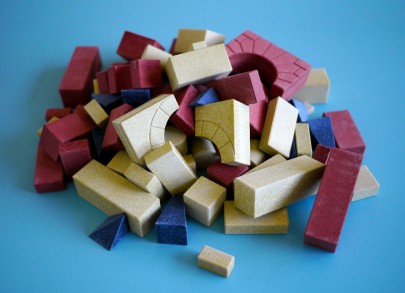
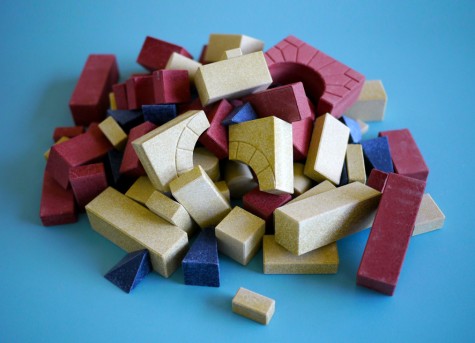
The course provides a short overview of the canonized Western-European architectural history by style and period from antiquity to the present, using different building types and constructions as exemplars. The course consists of individual presentations and fact sheets of selected buildings developed by the students, who ought to describe a monument and place it in the wider context of European architectural history. Aside from learning basic technical terms and their application, the use of and work with specialist literature as well as the implementation of expert knowledge will be trained. The course ends with an oral examination in which the knowledge acquired during the semester will be reviewed.
Bachelor seminar
Prof. Dr. Anna-Maria Meister, Prof. Dr. phil. Franziska Lang, Prof. Dr. Christiane Salge, M.A. Lisa Beißwanger, Dr.-Ing. Clemens Brünenberg, Dr. phil Meinrad von Engelberg
Tue, 09.00 – 11.00
1st meeting on Zoom: 03. Nov 2020
The course will introduce students to the key concepts that framed and defined modern architectural discourse. It situates architectural theory within historically relevant social and cultural debates and explores the architects’ response to the challenges generated by developing science and technology, the demographic transition, utopian and conservative ideologies, changing attitudes to labor and leisure, the rise and decline of industrial city. Through close readings of modernist architectural theory and critical texts, students will learn to comprehend the original conceptual message embodied in modern architectural monuments and urban fabric.
Bachelor seminar
Igor Demchenko
Mon, 14.00 – 17.00
1st meeting on Zoom: 02. Nov 2020
What does attitude mean in architecture? What does it mean to take on stance in architecture? Is it the sensational, breathtaking and unique bang? Is it innovative architecture form or a new material? What is »good« architecture in the first place? Architecture is far more than a formal issue. As architects we engage with space, we create space and shape the environment of everyone: the observer, the user, the passerby and far more. We configure space for encounter, participation, privacy and compartmentation perceived in various ways. In the seminar we will analyze the projects and buildings of 20th century architects focusing on relevant societal issues. We will critically scrutinize and evaluate their architectural solutions.
Bachelor seminar
Christiane Fülscher
Mon, 14.00 – 17.00
1st meeting on Zoom: 02. Nov 2020
In addition to a growing range of documentaries about architecture and urbanism there is also an increaseing number of festivals and awards dedicated to the specific genre of the Architecture Film. As diverse as the documentaries' questions and perspectives are, as wide-ranging present their aesthetic and methodological approaches. Frequently the film is not merely the outcome, but filming itself a method of research.
This course will examine different possibilities of cinematic documentation and depiction of architecture and space through a selection of documentaries, thereby analyzing the medium film for its potentials of communicating a critically reflected architecture production. During the corresponding exercise a mini short film will be produced.
Bachelorseminar
Anna Luise Schubert
Mon, 14.00 – 17.00
1st meeting on Zoom: 02. Nov 2020
Master:
This seminar offers an interdisciplinary introduction to gender and queer theories in their application to the architectural humanities. If gender is socially constructed and performative, as Judith Butler argues, what role does architecture play in this process? How do built structures not only represent sexual difference, but produce gendered subjectivities? Moreover, how might architecture, rather than just provide shelter for the human body, actually contribute to its making insofar as it renders material culturally specific knowledges of bodies? And finally, if modern binary notions of gender and the built environment are mutually co-constructed, can they be unbuilt to account for diverse identities and forms of embodiment? The seminar combines close reading and discussion of key texts with a series of practical exercises, in order to familiarise participants with feminist and queer strategies of knowledge production.
Master seminar
Torsten Lange
Mon, 14.00 – 17.00
1st meeting on Zoom: 09. Nov 2020
Courses in Summer Semester 2020
Bachelor:
Light, Air, Sun. Modern Architecture is made from (and for) modern materials: Aluminum promised lightness, prefabricated concrete efficiency, and glass transparency. But these visions of a new modern life were constructed from actual stuff and circulated in a larger cycle—they were excavated, produced, and sold. Given that modern architecture in the West was a very particular construction of values and aesthetics, we will trace its materials to uncover the other side of this hygienic, clean and minimalist imaginary: its ecological, social, political cost. We will look at toxic Bauxit-mining or the carbon-emissions of concrete. But we will also look at who was being let inside and who was kept outside of the lofty walls and landscape windows of this new architecture: who was exploited to produce this modernity, who was made comfortable by double-pane glass? Which climate was produced, and for whom? Which outside, which other needed modern man protection from—and how did modern architecture permanently enforce these dichotomies?
Bachelor seminar
Anna-Maria Meister
meister(at)atw.tu-darmstadt.de
Monday, 15:30–17:00
The seminar will be held via Zoom and Moodle
First session on Monday, 27. April 2020, 15:30, on Zoom
We are familiar with the term “choreography” mainly from the field of dance. There, it describes the organization of moving bodies in space as well as the written notation of temporal-spatial movement patterns. In this seminar, we will explore the relationship between choreography and architecture. The basic assumption being that every architectural concept or design anticipates and determines constellations and movement of bodies in space, from everyday actions to overarching circulation or guidance systems. Based on specific examples, we will identify and critically analyze choreographic aspects of architecture with the help of theories and concepts from the field of architecture and dance studies.
The seminar will be held in German. German and English reading skills are required.
Bachelor seminar
Lisa Beißwanger
beisswanger(at)atw.tu-darmstadt.de
Monday, 10:00–13:00, every 2nd week
The seminar will be held via Zoom and Moodle
First session on Monday, 27. April 2020, 10:00, on Zoom
Of the three primary bodily functions—eating, defecating, and resting—sleeping has been least investigated as part of the urban public realm. We are deprived of the right to sleep in public spaces. Driven by indigence or despaired exhaustion, people sleeping on the street always seem out of place, awkward, and vulnerable. Its civic display is rarely prompted by a place designed for it—if anything, objects are designed to prevent it.
What if we think of public sleeping in other ways? Can public sleeping envision a different understanding of our cities? Promoting sleep as a civic right, this seminar revisits past and envisions future urbanities, expanding the ways of inhabiting the cities to come.
Bachelor seminar
Jocelyn Froimovich
Sessions to be determined in the first Meeting
The seminar will be held via Zoom and Moodle
First session on Monday, 4. May 2020, 10:00–11:30, on Zoom
Master:
Geometry and arithmetic as proportion and symmetry have shaped the appearance of art and architecture since the earliest times.
From this, numerous aesthetic theories developed that tried to make 'objective beauty' plannable and reproducible. From the middle of the 19th century a boom in competing theories of proportion began that influenced architectural work well into the 20th century. Only with the possibilities of digital design does this development seem to have stopped.
Using different examples such as the design theory of J.L.M. Lauweriks, Ernst Neufert's theory of building regulations, Le Cobusier's modulator, the theory of coincidence and considerations on numerical aesthetics, the individual theories are examined and analyzed in their historical context.
Master seminar
Helge Svenshon
svenshon(at)gta.tu-darmstadt.de
Monday, 17:00–18:30
The seminar will be held via Zoom and Moodle
First session on Monday, 04. May 2020, 17:00, on Zoom
At the turn of the 20th century architects, particularly the younger generation, started to oppose to the established architectural forms of Historicism and the floral elements of Jugendstil. In view of the numerous historicist edifices expanding along the streets of the rapid grown cities, the architects criticized the inconsistency between the decorative facades and the structural principles as well as the spatial disposition behind. Instead they were searching for new uniting architectural forms to express the contemporary social changes and the industrial and technical achievements. In the course we will study and analyze the texts and constructions that present this search for an unprecedented style. Furthermore, we want to understand the motivations of the architects, which basic principles they incorporated, which innovations they introduced plus how they converted all of it into architecture.
Master seminar
Christiane Fülscher
fuelscher(at)atw.tu-darmstadt.de
Tuesday, 9:30–11:00, every week
The seminar will be held via Zoom and Moodle
First session on Tuesday, 28. April 2020, 9:30, on Zoom
Hardly any modern construction process works without concrete; and yet hardly any other building material polarizes as much: The perception of concrete fluctuates between intensive loathing and obsessive glorification. At the same time, the discourse commonly concentrates on concrete’s aesthetic and technical qualities. But the significance of a material is never derived from its physical properties alone.
This seminar will investigate the cultural, ideological, economic and organizational logics of the building material concrete, following particular historical and contemporary cases. We will not only evaluate the qualities of finished concrete, but research its comprehensive material flow from production and transport to construction, usage and disposal and thereby analyze the production of architecture critically.
The required readings and media are in English and German.
Master seminar
Anna Luise Schubert
schubert(at)atw.tu-darmstadt.de
Tuesday, 16:00–19:00, every 2nd week
The seminar will be held via Zoom and Moodle
First session on Tuesday, 28. April 2020, 16:00, on Zoom
The architect’s field of expertise has changed fundamentally over the second half of the 20th century as new technologies such as the Xerox machine (1959), the fax machine (1960s), the personal computer (the Apple II came out in 1977) and the Internet (1990) became available to the general public. While new skills have become a vital part of the architect’s daily routine today others were lost. This seminar takes a look at some of the changes that have resulted from the advent of the computer in architecture.
The seminar coincides with the exhibition “The Architecture Machine. The Role of Computers in Architecture” at the Architekturmuseum der TUM, in Munich (July 16 – October 25, 2020). The main question that this seminar and the exhibition will address is simple: Have the new digital tools changed architecture and if so, how? With the help of a reading list of key texts by protagonists of the digital movement we will retrace a variety of aspects connected to digital architectural forms including folds, blobs, parametric design and artificial intelligence. Selected case studies will examine the influence that software has had on the design of architecture. The seminar includes a field trip to the exhibition.
Bachelor seminar
Teresa Fankhänel, Architekturmuseum der TUM
Monday, 9:00–12:00 (25.5., 8.6., 22.6., 6.7.)
The seminar will be held via Zoom and Moodle (4 sessions plus briefs)
First session on Monday, 11. May 2020, 9:00–10:30, on Zoom
This course is part of module A (Historical Foundations).
The lecture series focuses on spaces that are built for festivals from very different cultural, religious but also political practices or those which were temporary constructions for their respective occasion. On the one hand, we will deal with festival buildings and the celebrations taking place in them, e.g. banquet halls, churches, houses of culture, festival halls or even clubs. On the other hand, we will look at ephemeral places of celebration, which are mostly constructed for a brief time with colour, light, fireworks, music as well as the people populating them. The latter are usually preserved as staged image, be it through instagrammable selfies or etchings. The topics of the lectures range from antiquity to the 21st century.
A task is set for the series of lectures, which is to be completed by 9 June 2020 and the results of which are graded.
Lecture Series
Prof. Dr. Franziska Lang, Prof. Dr. Christiane Salge, Prof. Dr. Anna-Maria Meister, Christiane Fülscher M.A., Dr. Martin Pozsgai, Anna Luise Schubert M.Sc.
First meeting: The lectures and further information on the event will be available online on moodle from 28.04.2020.
Overview:
- Franziska Lang: „Schall und Rauch – Festkultur im antiken Griechenland“
- Christiane Salge: „Ephemere und reale Festarchitektur in der Frühen Neuzeit“
- Martin Pozsgai: „Leuchtende Bilder der Nacht. Das höfische Feuerwerk der Barockzeit“
- Anna-Maria Meister: „Feiern – aber bitte im rechten Winkel?”
- Christiane Fülscher: „Das Fest im Kollektiv“
- Anna Luise Schubert: „From Rave to Riot. Contested Spaces of Light and Laser“
Courses in Winter Semester 2019/20
Bachelor:
Modern Architecture can no longer be looked at as a singular style emerging from Europe. Taking modernity as a pluralistic concept, this lecture will introduce a diverse array of global geographies and multiple aesthetics. We will look at these “constructions of modernities” both in their political and aesthetic intentions, and will evaluate not just their success, but their social consequences. Studying the emergence of new materials, we will see how changing economic and labor conditions produced new architectures. Studying iconic buildings and settlements, we will expand our view to their extension into the colonies to investigate how the rationality often assigned to modern architecture was also a mode of control and extortion. We will encounter modern architectures, question their ideologies, and contextualize their construction.
BA Lecture Course
Prof. Dr. Anna-Maria Meister
Master:
The advent of cybernetics in the post-WWII period seemed to fulfill an architectural dream of predictable performance and objective beauty. Yet rule-based design has a long history¬¬: from proportions to standards, architects have repeatedly tried to not only prescribe form, but also exert social and political control. Hence “Design Rules” must also be looked at regarding their ideological intent and human consequence. This seminar will examine both rules imposed from without—standards, norms, regulations—and those deliberately introduced as part of the design process—proportions, combinatorics, and algorithms. In this seminar we want to ask: What are the architectural, spatial, and political implications of design rules, whether prescribed or self-imposed? How have irrational tendencies been complicit in, or even instrumental to, how design rules? Where does control end and excess begin? And lastly: whom do they serve?
Master Seminar
Prof. Dr. Anna-Maria Meister
How do we relate to the world around us? And how does our ideas about the environment inform the way we design? In this class, we will look at how the environment has been historically defined and understood by scientists, philosophers, and architects, and how these theories have worked to both organize and restrict our thoughts about architecture. Through classroom discussions, group exercises, and writing assignments, we will identify, discuss, and critique central terms and ideas that have structured the relationship between humans and their environment in the 20th and 21st centuries. Throughout the semester we will address questions such as: How have architects historically engaged in discussions about the environment, and how are they engaging today? How is “environment” different from space, milieu or atmosphere? What is the role of architecture in creating distinctions between nature/culture, inside/outside, and human/non-human? How do ideas of the environment determine not only how architects design, but who and what they design for? And how can rethinking theories of the environment help us to reimagine our own practice faced with the environmental crisis?
Master seminar
Victoria Øye, M.Sc.
From half-timber houses in Lüderitz, Namibia to German modernist prefabrication—colonial architecture takes many shapes and forms. This course considers different approaches to the relationship of architecture and empire in the nineteenth and early twentieth centuries. The aim is for students to gain historic and theoretical knowledge about colonialism’s relationship to the built environment and to develop the skills to critically assess historic architecture in its imperial context. Where can we locate empire, what do we need to look for, how do we look? Discussing well-researched case studies from the British, French, and Belgian empires, we will compile several ways in which architecture has been considered instrumental for colonial regimes to exert power abroad and at home. Reflecting on these case-studies, students will then work in groups to conduct their own projects within the lesser-known German context by identifying key terms, actors, and sites, creating own maps, and developing potential future research agendas. Being built directly into the cityscape, colonial worldviews wittingly or unwittingly shaped architectural Modernism and arguably continue to influence our present. Part of the seminar is therefore also an excursion to Frankfurt am Main, where we will search for colonial traces in an urban fabric not usually associated with Germany’s imperial project. Assigned readings will be in German and English.


